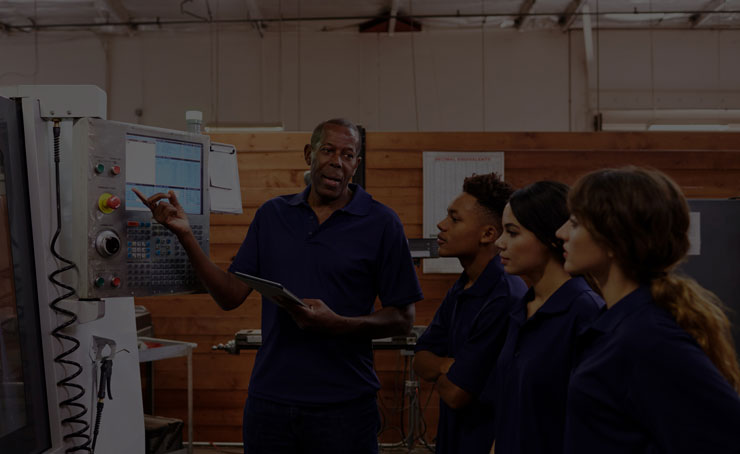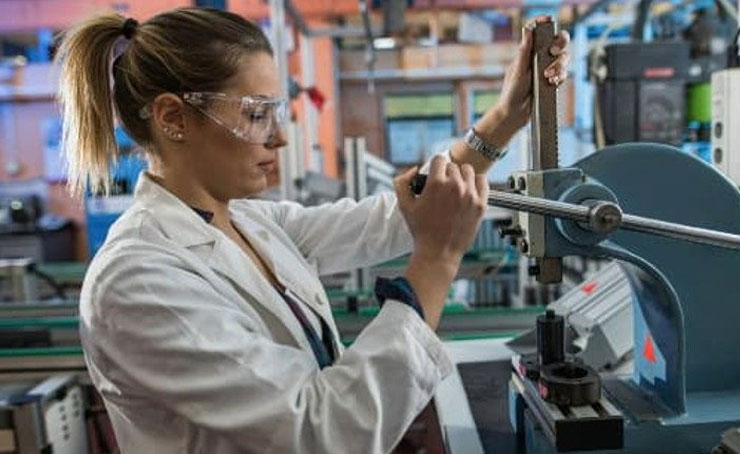Be a Blog Subscriber
Join thousands of manufacturing leaders and professionals who get the Accelerate blog delivered straight to their inbox


Recently, we highlighted two organizations — Robert C. Byrd Institute and Jane Addams Resource Corporation — that are making an important difference by providing job training and skills development to underserved communities.
Now we’d like to introduce you to two additional programs that are building an important pipeline of entry-level manufacturing employees while providing family-sustaining wages and promising careers to individuals in local communities.
The Eastern Connecticut Manufacturing Pipeline Initiative (MPI) was developed in 2016 to address the urgent need for skilled trades workers at General Dynamics Electric Boat, the Groton, Conn.-based submarine designer and builder, and nearly 50 companies in the Eastern Advanced Manufacturing Alliance (EAMA).
“MPI was created to build the next generation of the manufacturing workforce,” said Bret Jacobson, Manufacturing Apprenticeship Center Director, Three Rivers Community College, a training partner. “We built the curriculum based on employer need, asking ‘What does each entry-level worker need to come into a job?’”
The relatively short six-to-eight-week free training programs are designed to accommodate unemployed and underemployed workers who are unable to attend longer-term training.
The curriculum, which was created with input from local employers and their suppliers, includes classroom training and online courses from Tooling U-SME. The programs trains for in-demand jobs such as CNC Milling Machinists, Outside Machinists, Welders, Machine Operators, Assemblers and more.
“As we went along, we added more and different classes,” said Jacobson. “We found that the core skill level classes cover most of the need, with added specialized levels of training based on the trade to help ensure graduates are successful on day one.”
Courses are taught by Three Rivers Community College faculty at Ella Grasso Technical School in Groton.
The MPI program is funded by a 4-year, $6 million U.S. Department of Labor Workforce Innovation Grant (WIF) for Eastern Connecticut in partnership with the Connecticut Department of Labor and the Eastern Connecticut Workforce Investment Board (EWIB).
“With the first grant written, 1,400 students signed up when we had anticipated about 400,” said Jacobson. “Participation was much higher than expected and, with a strong placement rate, the program has become a national model.”
Since 2016, more than 10,000 individuals have applied to the program. Nearly 80 training classes have graduated students in trades such as welding, machining, pipefitting, electrical, sheet metal, and design & drafting.
Jacobson said the demographics of participating students are diverse, reaching women, minorities, veterans, and others.
“Our goal is for our students to get job offers before they graduate,” said Jacobson.
Students receive support from the American Job Centers for both job placement and to reduce barriers to enrollment and completion during training. Supportive services include travel reimbursement, daycare assistance, and required books, tools, and clothing. Additionally, there is a cash stipend awarded to participants for successful completion of classroom training benchmarks.
Since the program started, MPI has made nearly 1,900 job placements, much more than the original target. This is an impressive placement rate of more than 95 percent.
Many graduates land jobs at Electric Boat and other EAMA-member companies where they earn competitive wages with benefits and the opportunity to grow along an exciting career path. Opportunities include on-the-job training and, often, apprenticeships.
Employers report that program graduates have much better retention rates than other employees hired through traditional channels. New hire training time has dropped by 50 percent. All of this leads to millions of dollars in savings annually.
With an available talent pipeline, local employers have been able to expand, creating an economic boost locally.
An off-shoot program called the Youth Manufacturing Pipeline Initiative (YMPI) is helping expand the local pipeline. Fifteen Eastern Connecticut high schools participate in the program where students can earn manufacturing credits to continue their manufacturing education after graduation.
“Participation in these training programs is a game changer,” Jacobson said. “I ran into a past student who, three years after graduation, was pulling in over $100,000 a year, had a new truck and was about to get married. The opportunities are there and, if you take them, they can be life changing.”
Another organization doing great things is Impact NW.
What started in 1966 as a neighborhood initiative to combat poverty in Southeast Portland, Oregon, has grown into one of the largest and most comprehensive homelessness prevention providers in the Portland-Vancouver region.
The organization serves more than 20,000 people a year, including low-income children, at-risk youth, young adults, families, veterans, and seniors. Impact NW provides programs that stabilize and strengthen, by providing safety net services (i.e., housing and utility assistance, permanent housing) as well as support services (i.e., job training, parenting support and opportunities for children).
We first got to know NW Impact when they started using Tooling U-SME online classes for their Career Opportunities Readiness & Exploration (CORE) program which helps local youth engage in career pathway preparation to build the skills and confidence needed to land good jobs.
“We help people get ready for the workforce,” said Brandi Dancen, assistant director of Youth and Family Services, Impact NW. “A lot of folks face barriers to employment. We help prepare them to get into good jobs and be successful.”
Another one of Impact NW’s successful programs is their Manufacturing Pre-Apprenticeship, geared toward individuals 18 to 26 years old. Since 2017, more than 100 students have gone through the program.
“There are over 10,000 positions open in the metro region, and through the pre-apprenticeship program, we are helping local young adults enter the workforce and earn a living wage,” said Dancen. “In this area, manufacturing is a high-growth, high-demand and high-wage industry.”
Program participants gain relevant, industry-specific technical knowledge with 3D printers, mini CNC machines, band saws, belt grinders, calipers, laser engravers, forklifts, and drill presses. They also learn employability skills in communications, punctuality, problem-solving and collaboration.
Successful graduates have an opportunity for a paid internship. In addition, Impact NW helps with job placement and, in some cases, helps place candidates into formal apprenticeship programs.
“The industry is looking for skilled labor,” Dancen said. “We are trying to connect people who need jobs with people who need employees and are willing to pay a living wage to set them up for success in the future.”
Dancen said that Tooling U-SME classes bolstered the curriculum, especially during the pandemic.
“Covid removed hands-on training and left a gap,” said Dancen. “Tooling U-SME provided avenues for students to learn processes and principles without the hands-on piece.”
The Tooling U-SME curriculum provided online classes covering an introduction to machining, CNC, additive manufacturing, and robotics.
Many programs struggle with interesting students in manufacturing as a career pathway, and Impact NW’s Pathways to Manufacturing (PTM) program is designed to help.
Through industry site visits, soft skill and technical training and paid summer internships, PTM prepares and educates students for careers and post-secondary training in manufacturing and the skilled trades. PTM is now in seven different high schools. The program has reached over 500 students, and successfully placed graduates in more than 40 internships. Currently, 50 percent of former students polled are either employed in manufacturing or in a skilled trade.
PTM serves as a pipeline into the pre-apprenticeship program.
“If you peel the layers of the onion to show students different types of day-to-day activities in manufacturing, they start to identify with the industry and grow passionate about it,” Dancen said. “As part of the pre-apprenticeship program, Tooling U-SME’s Certified Manufacturing Associate credential opens additional doors, helping students explore even more.”
Tooling U-SME’s Certified Manufacturing Associate (CMfgA) is a certification focused on basic manufacturing concepts to prepare individuals for a new career in manufacturing.
“If students have never interacted with the concepts or had any hands-on experience with manufacturing, it’s a hard sell until they hear about all the promising career opportunities,” said Dancen.
We applaud MPI and Impact NW for their dedication to building strong opportunities in the manufacturing industry, especially for underserved communities. Connecting this talent pipeline to local employers helps keep their local areas vibrant and growing.
As a non-profit, we are dedicated to helping organizations like MPI and Impact NW. We welcome you to reach out to us if we can help your organization, too. Contact us to learn how.
Join thousands of manufacturing leaders and professionals who get the Accelerate blog delivered straight to their inbox